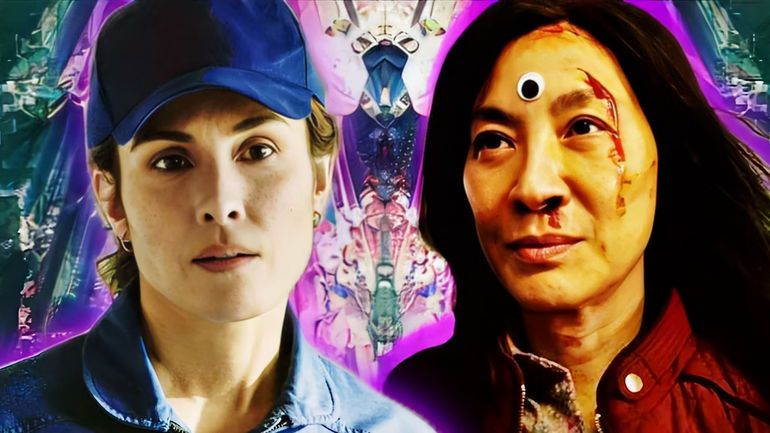
An overused science fiction trope was seemingly on the brink of burning out, but a new Apple TV+ show proves that it can still be used as a conduit for fresh and innovative storytelling. Since there is no limit to how vast and expansive the science fiction genre can be, it accommodates numerous fascinating tropes and narrative devices that are consistently used in television shows and movies. From futuristic technologies and dystopian worlds to mindbending explorations of space and time, the sci-fi genre offers viewers a glimpse into their own wildest aspirations and fears.
Warning! Contains mild spoilers for Constellation.
Apple TV+'s new sci-fi show, "Constellation," explores the concept of alternate realities, much like many other sci-fi movies and shows.
Noomi Rapace as Jo in Constellation - Like Many Sci-fi Movies & Shows, Apple TV+'s Constellation Is About Alternate Realities
The idea of parallel universes, alternate realities, and multiverses has become quite popular in modern sci-fi films. While the Marvel Cinematic Universe has explored this concept creatively, the movie Everything Everywhere All At Once has truly raised the bar on how parallel universes and alternate realities can be portrayed in film. However, the overuse of this trope in movies and television has started to restrict the narrative possibilities that filmmakers can explore through it, despite the endless potential that parallel universes theoretically offer.
Constellation Brings a Unique Spin To The Parallel Universe Storytelling Trope
Apple TV+'s Constellation has joined the long list of TV shows focusing on alternate realities. The show initially begins as a typical space drama where its main character, Jo, is on a time-bound mission to fix the International Space Station and return to Earth. Once she returns home, she experiences a strange shift in her reality after finding herself in a liminal space between two parallel universes. While Constellation seems to be harping on the tried and tested waters of alternate realities and parallel worlds, it brings an intriguing spin to the familiar trope.
Noomi Rapace as Jo holding her daughter's face in her hands in Constellation - Constellation Brings a Unique Spin To The Parallel Universe Storytelling Trope
Constellation takes a different approach compared to popular movies like Everything Everywhere All At Once or Doctor Strange. Instead of just exploring parallel universes, it dives into complex high-concept science fiction. By introducing ideas like superposition, interference effect, and the observers' effect from quantum physics, Constellation pushes the boundaries of the genre. While these concepts may not be easy to grasp, Apple TV+'s Constellation does an amazing job at exploring the scientific and philosophical implications of quantum mechanics while giving a fresh take on the parallel universe theme.
New Constellation episodes premiere every Wednesday on Apple TV+.
Editor's P/S:
The article effectively highlights the potential of overused sci-fi tropes, particularly the concept of alternate realities, to spark innovative storytelling. The example of Apple TV+'s "Constellation" demonstrates how fresh perspectives can breathe new life into familiar ideas. By incorporating complex scientific principles and philosophical implications, "Constellation" pushes the boundaries of the genre and offers a unique take on parallel universes. The article sparks an appreciation for the ability of sci-fi to explore both the possibilities of the unknown and the nature of our own reality.
Furthermore, the article underscores the importance of avoiding narrative stagnation in sci-fi. While tropes can provide a familiar framework, it is essential for creators to challenge conventions and explore new avenues of storytelling. "Constellation" serves as a testament to the fact that even well-established tropes can be used to craft compelling and thought-provoking narratives. The article encourages readers to embrace the evolution of sci-fi and appreciate the potential of fresh perspectives within the genre.















